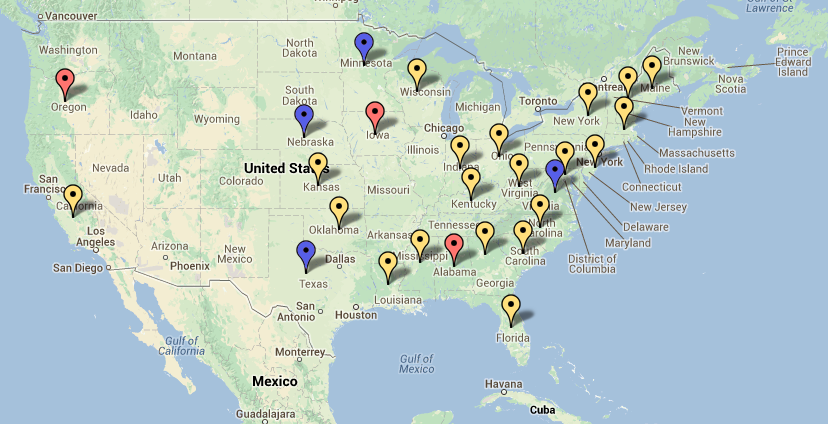The Art of Teaching Science: Is the Common Standards Movement Unraveling?
Mercedes Schneider, on her EduBlog, wrote several articles documenting a growing movement against the Common Core State Standards (CCSS) by describing legislative action, and citizen protests in 23 states. I’ve used her observations to create a map locating these events across the U.S. I’ve also included on the map the states that did not endorse the CCSS at all.
The Race to the Top (RT3) competition was the carrot the U.S. Department of Education used to entice states to adopt the Common Core State Standards. If a state choose not to adopt the common core, then there was a high likelihood their RT3 proposal would suffer the consequences. (The ED department used the same technique to make sure states use student test scores in teacher evaluations).
The context for the map and the sign that there a sweeping national backlash against the CCSS is described here by Mercedes Schneider when she says:
CCSS was not democratically vetted prior to 45 governors and state superintendents (and let us not forget the District of Columbia) signing to accept it.
No legislative vote was required for CCSS acceptance as far as President Obama and US Secretary of Education Duncan were concerned. Just two signatures sealed the deal for a state to agree to the inflexible (and at the time of signing, possibly unfinished) CCSS as part of Race to the Top (RTTT).
In order to coerce states into agreeing to this “state-led initiative,” the federal government had to become the incentive-dangling “hub.” Thus, “state led” means “led right into RTTT agreement with the USDOE.” (Schneider, M. Common Core Unrest in 22 States. Retrieved January 5, 2014, from http://deutsch29.wordpress.com)
The backlash is coming from all fronts, the right, left and the middle. You can click on the red (rescinded the Common Core), yellow (Common Core protest activity) or blue (no-Common Core states) markers to read a brief written by Schneider on her blog. In only two cases, has a state officially changed its mind from adopt to reject the standards. But as you will see there is legislative action many of the blank color states.
The research that I’ve reported on this blog the value and effects of standards does not bode well for the supporters of national standards, or even state standards. Standards block learning much like a brick wall. The use of standards imposes unsupported litany of what teachers are required to teach with little to no input locally.
The standards-based accountability system of schooling treats students as androids who come to school to mechanically learn to follow a path established by adults, many of whom have no idea what it is like in a 3rd, 8th, or 12th grade classroom. Nor do these adults have any idea about the aspirations, creativity, and inventiveness of students in these grades. Yet, these policy makers have established a system of education that is a meticulous set of performance statements that all students should learn in mathematics, English language arts (The Common Core State Standards), and science (The Next Generation Science Standards).
Schooling should help open minds, not close them. Requiring students to learn content that may or may not be important to them is not based on science, its mere opinion. More than that, much of the pedagogy that is used directs students to master content in preparation for a test.
Mercedes Schneider’s analysis suggests a possible unraveling of the common standards movement. Explore the unraveling in the map in Figure 1.
Figure 1. Mapping Common Core State Standards Unrest (data based on Mercedes Schneider’s EduBlog.
This blog post has been shared by permission from the author.
Readers wishing to comment on the content are encouraged to do so via the link to the original post.
Find the original post here:
The views expressed by the blogger are not necessarily those of NEPC.

